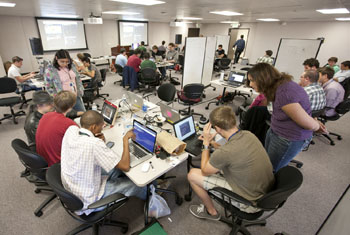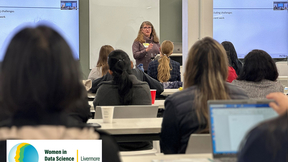Training tomorrow's cyber security specialists
 (Download Image)
(Download Image)
During the 'Capture the Flag' contest, students in the Cyber Defenders program compete in teams to solve problems and test their skills.
Now in its second year at LLNL, the Cyber Defenders program led by Computation's Celeste Matarazzo, a principal investigator in the Center for Applied Scientific Computing, has enrolled 21 computer science and engineering students from across the United States. Participants are selected from a pool of more than 200 candidates ranging from undergraduate students, master's degree students and Ph.D. candidates in computer science, engineering, electrical engineering, mathematics, political science or a related field of study.
"The goal is to present a broad set of disciplines to enhance the students' awareness of cyber security," Matarrazo explains.
Over the course of 10 to 12 weeks (program length varies per participant) students attend lectures, seminars, work on technical projects applying technologies, develop solutions to computer security related problems of national interest and explore new technologies that can be applied to computer security.
A challenge in developing the Cyber Defenders program, Matarazzo says, lies not only in participant selection, but in matching the students with an appropriate Lab mentor along with a project reflective of each student's major and interest.
"Cyber security is barely a discipline," she noted, describing it as one of the newest and fastest growing fields, whose popularity is largely founded on a growing need to combat illegal network hacking and stolen data, problems currently experienced by government agencies, corporations and individual citizens alike.
Working on real world projects is paramount, Matarazzo says about the program's curriculum. The overall topic of cyber security is exciting and is more than compliance and procedures, she says, so for these bright young cyber defenders, the activities need to capture their imagination and "can't be boring."
'Capture the Flag' sparks interest in computing and competing
Perhaps the pinnacle of the program is a two and one-half day exercise called "Capture the Flag," created and directed by Los Alamos National Laboratory's Neale Pickett of the advanced computing solutions group. With more than 20 years experience in network security, Pickett has developed Capture the Flag for cyber 'whiz kids' and takes it to DOE and NNSA institutions, and universities across the country.
During the competition conducted here on site at LLNL, in late July, the cyber defender students were motivated to collect points. They huddled in groups at computers positioned around a large conference room in the Lab's new High Performance Computing Information Center.
There's not much talking, but a lot of clicking of computer keys and fast-paced music playing in the background. It is all part of the ambiance, says Pickett, to capture the interest and skills of future cyber specialists.
Posted at the head of the class is a color-coded chart mapping the various levels that must be completed by each competitor, and a way to keep track of a team's progress.
Teams have to solve each puzzle, which tests particular skills and abilities in such areas as code breaking, math, sequencing, information hiding and network engineering.
Working in teams reinforces a work-life concept that there are "lots of different people (who are) working together," to solve problems, Pickett says. "At the core, the students are more interested in solving than getting the highest score in this competition."
Although computer security might seem like what is depicted in the movies, the reality is there are people out there using software in ways it's not intended for, Pickett said.
Contact
Linda A Lucchetti[email protected]
925-422-5815
Tags
HPC, Simulation, and Data ScienceComputing
HPC Innovation Center
Science
Featured Articles







